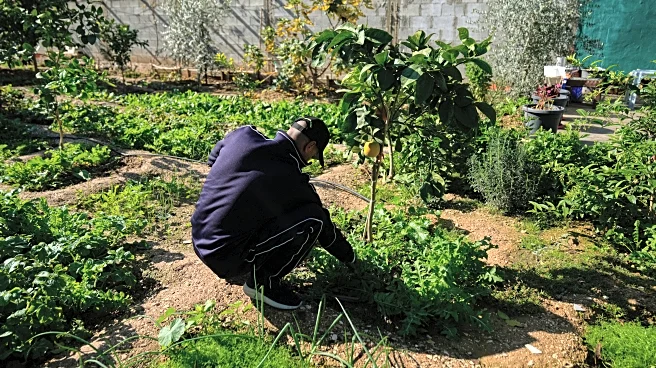What's Happening?
President Trump is signaling a focus on affordability as he and Republicans aim to maintain their congressional majorities in the upcoming 2026 midterm elections. Rising electricity bills are becoming
a central issue, with costs increasing faster than U.S. inflation in many areas. This issue was prominent in recent gubernatorial elections in states like New Jersey, Virginia, and Georgia, where Democrats won seats on the state's utility regulatory commission. Gas and electric utilities have sought or secured rate increases totaling over $34 billion in the first three quarters of 2025, more than double the previous year. With approximately 80 million Americans struggling to pay their utility bills, affordability is a pressing concern. In Georgia, proposals to build data centers have sparked community debates, with Democrats questioning whether these centers will share costs fairly with regular ratepayers.
Why It's Important?
The rising cost of electricity is a significant concern for many Americans, affecting household budgets and becoming a pivotal issue in political campaigns. As utilities seek substantial rate increases, the financial burden on consumers grows, leading to potential political ramifications. The focus on affordability could influence voter behavior in the 2026 midterms, impacting the balance of power in Congress. States with fast-rising electric bills or data center hotspots, such as California, Georgia, and Texas, are expected to be key battlegrounds. The issue also highlights the tension between economic development through data centers and the financial impact on local communities. The outcome of these debates could shape future energy policies and regulatory approaches.
What's Next?
As the 2026 midterm elections approach, the debate over electricity costs and affordability is likely to intensify. Political leaders, including President Trump, may continue to emphasize affordability in their campaigns. Utility companies may face increased scrutiny over rate increases, and proposals to expand power generating capacity to meet data center demand will be closely watched. States with significant data center growth may see legislative efforts to protect regular ratepayers from bearing the costs of connecting these centers to the grid. Additionally, the impact of federal government actions, such as shutdowns affecting low-income heating aid, could further influence public sentiment and political strategies.
Beyond the Headlines
The rising electricity costs underscore broader issues related to energy infrastructure and economic priorities. The push for data centers, while economically beneficial, raises questions about environmental impact and equitable cost distribution. Communities opposing data center developments highlight concerns about local quality of life and environmental sustainability. The situation also reflects the challenges of modernizing the energy grid to withstand extreme weather and meet growing demand. These developments may prompt discussions on balancing technological advancement with social and environmental responsibility.












